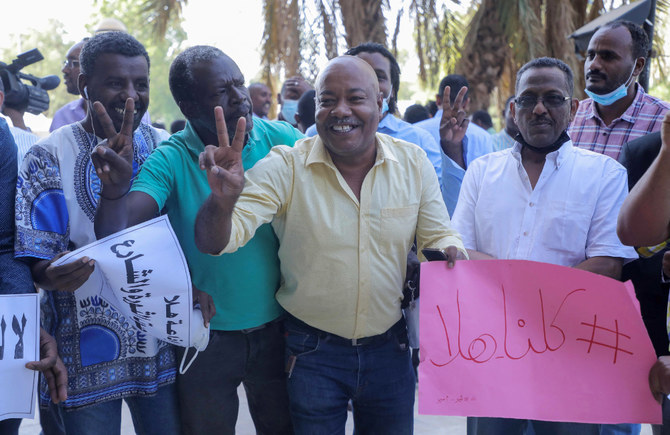KHARTOUM: A lively youth-run radio station, Sudan’s 96.0 FM was muzzled for 46 days after authorities banished the channel from the airwaves following an Oct. 25 military coup.
“I felt like a person who had the ability to speak and suddenly stopped ... It’s a painful feeling,” Khaled Yehia, production manager of “Hala 96,” told AFP from the station’s headquarters overlooking the Nile in Khartoum.
Sudan, with a long history of military coups, has undergone a fragile journey toward civilian rule since the 2019 ousting of former President Omar Bashir following mass street protests.
A joint military-civilian transitional government took over, but the troubled alliance was shattered on Oct. 25 when Gen. Abdel Fattah Al-Burhan launched a military coup that sparked international condemnation, mass protests and deadly crackdowns.
Despite the release of Prime Minister Abdalla Hamdok from effective house arrest, several radio broadcasts were silenced.
The Information Ministry refused to renew the license of Monte Carlo radio’s Arabic service, which broadcasts from Paris, while the BBC’s Arabic service was banned.
I felt like a person who had the ability to speak and suddenly stopped ... It’s a painful feeling.
Khaled Yehia, Production manager of Hala 96
“All of the other radio channels were back on air two weeks after the coup except for Hala 96, BBC and Monte Carlo (RMC),” said Abiy Abdel Halim, Hala’s programming manager.
“When we asked the authorities for the reason, we were referred to a military official who said there were orders from above regarding the editorial line of the station,” he added.
Hala 96 was finally allowed to go back on the air on Thursday.
Founded in 2014 under the heavy-handed rule of Bashir, Hala Radio hit the airwaves with daily programs alternating between politics, culture and sports.
“We started playing patriotic songs that would mobilize crowds,” when the demonstrations against Bashir in December 2018 began, Abdel Halim said.
“And we weren’t even stopped back then save for one time and only for 24 hours.”
Boasting a staff of 35 on-air presenters, journalists, technicians and administrators all under 40, they mirror the demographics of Sudan.
Youth represent about 68 percent of the country’s 48 million-strong population.
On Wednesday, dozens of journalists protested in front of the radio channel’s headquarters carrying banners with the words “Free Hala 96.”
Throughout Bashir’s dictatorial reign, Sudan ranked 174 out of 180 countries on Reporters Without Borders’ Press Freedom Index. Following his ousting, it marginally improved to 159.
“What with propaganda, the internet being disconnected and the crackdown on journalists, this military coup has jeopardized the fragile gains from the revolution,” the Paris-based press freedom group said last month.
It described Sudan as a “very hostile environment” for media to operate.
Last week in a report submitted to the Security Council, UN Secretary-General Antonio Guterres urged Sudanese authorities to “respect freedom of speech and of the press.”






















